• Aluminum
What Everyone Needs to Know About Aluminum Cookware

Reviewed by Trinity Anderson
Last Updated January 2024
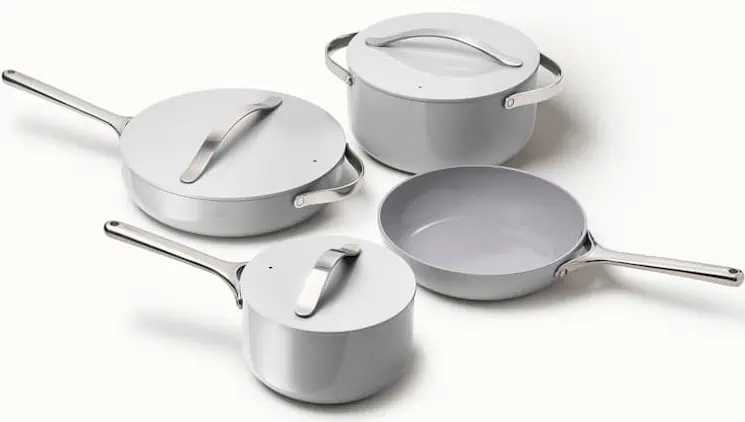
Wondering about Aluminum Cookware? Here’s an interesting fact…
.jpg)
According to the Cookware Manufacturers Association, aluminum cookware sales constituted nearly 60% of the total cookware sales in the United States in 2015.
It is interesting to note that a majority of us rely on aluminum cookware, yet our knowledge about it seems to be lacking. I receive numerous inquiries and requests for comprehensive reviews on aluminum cookware on a daily basis. Some common questions include:
- What exactly is anodized aluminum?
- What is the difference between hard anodized aluminum and non-stick cookware?
- Is aluminum cookware safe?
In this article, my aim is to provide answers to all these questions and more. Let's begin.
Why use aluminum?
Aluminum, being an excellent heat conductor, is an optimal choice for cookware due to its ability to evenly distribute heat. To provide a clear comparison, a table has been included to showcase the thermal conductivity of various metals, measured in w/m.k or watts per meter-kelvin. Notably, aluminum exhibits a thermal conductivity that is 16 times higher than that of stainless steel.
This implies that when using aluminum cookware, you can expect it to heat up rapidly, uniformly, and 16 times faster than a stainless steel pot.
| Material | Thermal conductivity (W/m.K) |
|---|---|
| Copper | 401 |
| Aluminum | 237 |
| Nickel | 91 |
| Cast Iron | 80 |
| Tin | 67 |
| Stainless Steel | 14.2 |
Furthermore, it is worth mentioning that aluminum is the third most abundant element found in nature, which translates to its affordability. In addition, its lightweight nature adds to its appeal. It is no surprise that aluminum cookware is highly favored among all other options.
The problem with Aluminum is…
Aluminum has a tendency to react with acidic food, resulting in the transfer of metal into the food. As a result, it is common to find aluminum cookware that is either coated with a non-stick layer or has undergone anodization process.
What is anodized aluminum?
Alright, let's dive into some chemistry basics. When aluminum is exposed to the air, it naturally develops a thin layer of aluminum oxide on its surface. Despite its thinness, this layer is remarkably strong and tough. Its primary function is to act as a barrier between the aluminum and the air, preventing further oxidation. Scientists refer to this process as "passivation," as it renders the metal passive rather than reactive.
Interestingly, both sapphires and rubies are gemstones composed of aluminum oxide, albeit in different colors. Due to its hardness, aluminum oxide is also utilized as a commercial abrasive.
To enhance the thickness of the aluminum oxide layer, a technique called anodization is employed. This electrochemical process results in a significantly thicker layer of non-reactive aluminum oxide, giving rise to what is known as anodized or hard-anodized aluminum.
Is anodized aluminum the same as hard anodized aluminum?
Although both indicate the presence of aluminum oxide on the metal's surface, there exists a distinction. Hard anodized, to put it simply, boasts a thicker layer of aluminum oxide compared to regular anodized. As a result, the metal acquires twice the strength of stainless steel and exhibits remarkable durability, non-reactivity, and resistance to both corrosion and abrasion.
Can hard anodized aluminum peel off?
The anodized aluminum layer is not comparable to paint or a coating; rather, it is fully integrated with the underlying metal. Consequently, it is incapable of peeling or chipping off, as it forms an inseparable part of the material.
Moreover, according to certain sources, it possesses a hardness nearly equivalent to that of diamond. This exceptional attribute enables it to effectively safeguard against scratches and maintain the integrity of the aluminum core.
Is hard anodized aluminum non-stick?
Hard anodized aluminum is inherently resistant to sticking, although it is not completely non-stick. Nowadays, the majority of hard anodized aluminum pans come with a non-stick coating.
What’s the difference between hard anodized and non-stick?
Calphalon introduced anodized aluminum cookware in 1968 to meet the high demands of professional chefs. This innovative material was specifically designed to withstand the rigorous conditions of commercial kitchens. In 1976, Calphalon made their Commercial Hard Anodized line accessible to home cooks, allowing them to experience the benefits of this durable cookware. However, this particular product is no longer available and has been replaced by traditional non-stick coated cookware.
Non-stick aluminum cookware, on the other hand, is made of aluminum with a non-stick coating. This coating can either be PTFE-based, such as Teflon, or ceramic-based. It is important to note that non-stick aluminum cookware may or may not be hard anodized.
Is a non-stick coated pan with hard anodized aluminum better than one with non-anodized aluminum?
A brief examination of Amazon reveals that a non-stick pan made of hard anodized aluminum generally carries a higher price tag compared to a non-stick pan made of plain aluminum. However, despite the additional cost, I would always recommend opting for a hard anodized non-stick pan or set over plain aluminum. Here's why:
First and foremost, hard-anodized aluminum undergoes an additional process that significantly enhances its hardness, strength, and scratch resistance compared to plain aluminum. This results in a remarkably durable pan, thanks to the exceptional toughness of the hard anodized surface.
Secondly, the non-stick coating applied to a hard anodized aluminum pan lasts much longer than that of a plain aluminum pan. In fact, according to Circuloncanada.ca, when subjected to an abrasion test using the same quality of non-stick coating, the hard anodized material proved to be three times more durable than plain aluminum.
Lastly, in the case of hard anodized pans, even if the non-stick coating wears off or gets scratched, the food will not come into contact with plain aluminum. As we are aware, aluminum reacts with certain foods, especially acidic ones, causing the metal to leach into the food during cooking. On the other hand, hard anodized aluminum is highly non-reactive.
To conclude, it is worth investing the extra money in a hard anodized non-stick pan. Based on my personal experience, you will enjoy a much longer-lasting non-stick cooking surface.
What are the different types of aluminum cookware and best options for each?
When it comes to aluminum cookware you have 5 main options. Here are some details about each and a suggestion for best option:
Plain aluminum
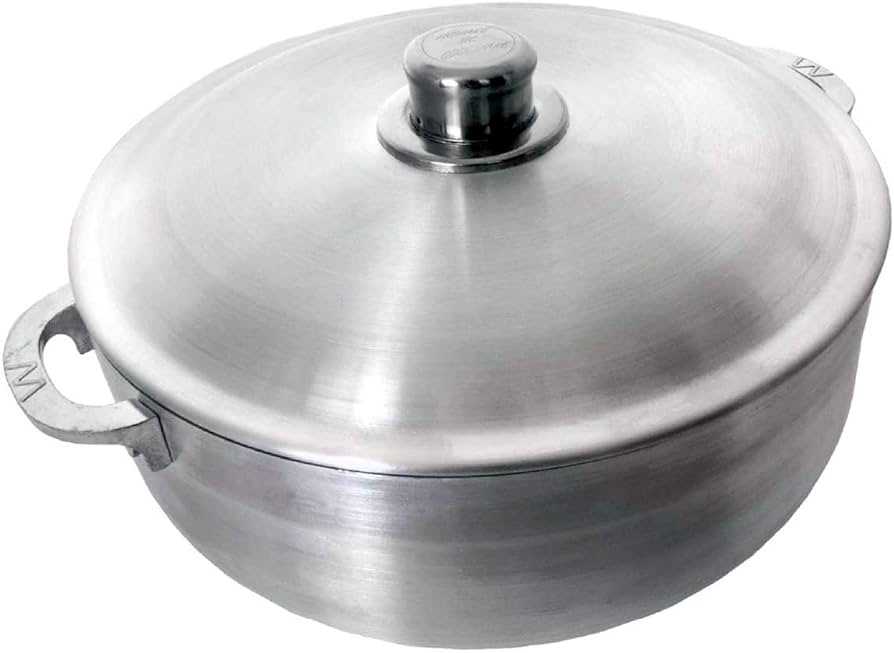
This aluminum is not hard anodized and lacks any coating. Due to its reactivity with food, it is no longer widely accessible in North America. However, there are still a few limited choices, such as this Cajun cookware aluminum Dutch oven. If you are looking for a pressure cooker, some of the finest stove top alternatives are plain aluminum.
Plain aluminum with ceramic nonstick coating
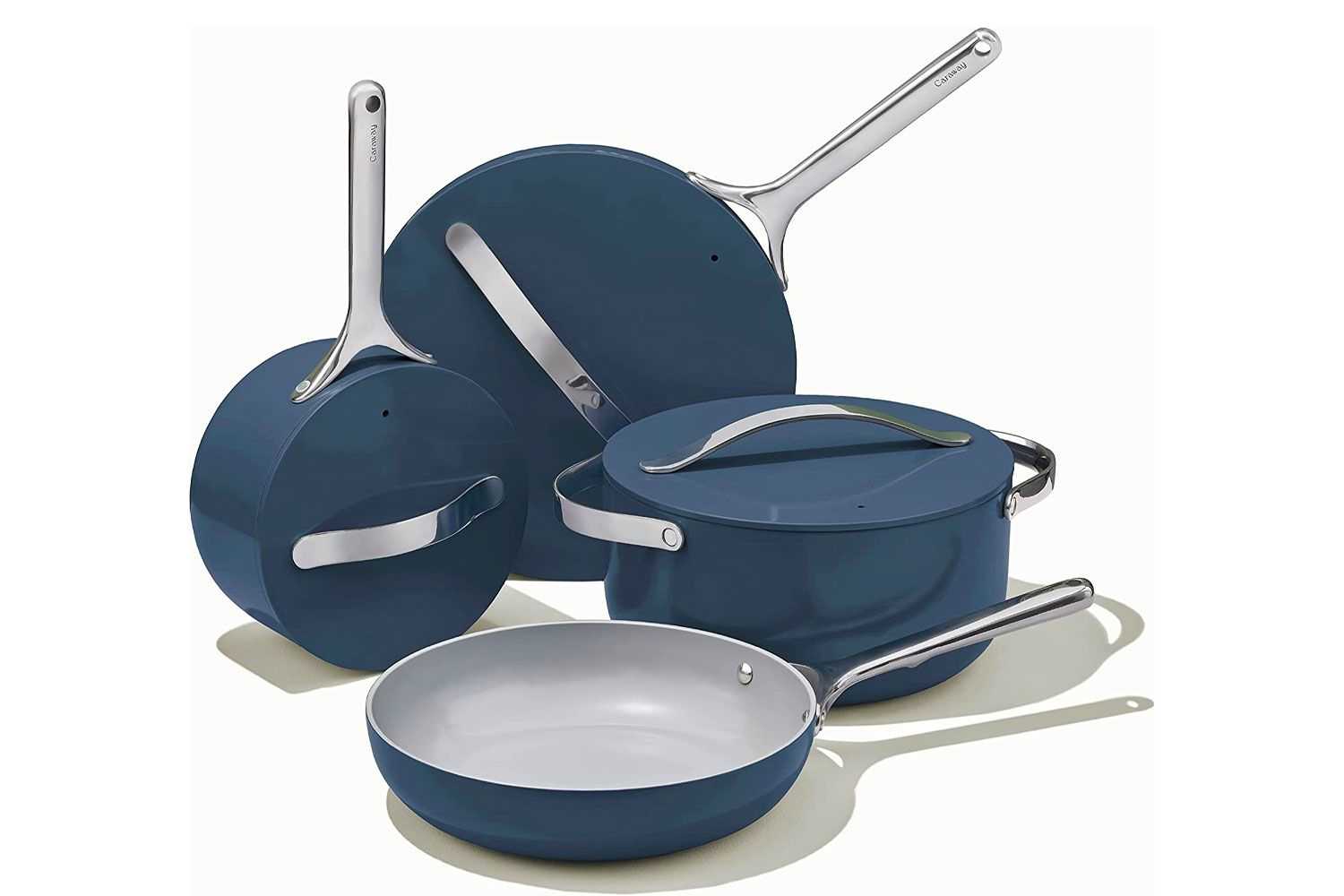
Caraway cookware stands out as the top choice in this particular category. It is personally one of my preferred cookware sets that I frequently utilize in my everyday cooking routine.
Crafted from heavy gauge aluminum and featuring a stainless steel base, Caraway cookware is not only durable but also compatible with induction cooktops. Moreover, the company prioritizes eco-friendly production methods, which is why they opt for plain aluminum instead of hard anodized. For further details, you can refer to my comprehensive review or make a purchase directly from here.
Plain aluminum with Teflon/PTFE nonstick coating.
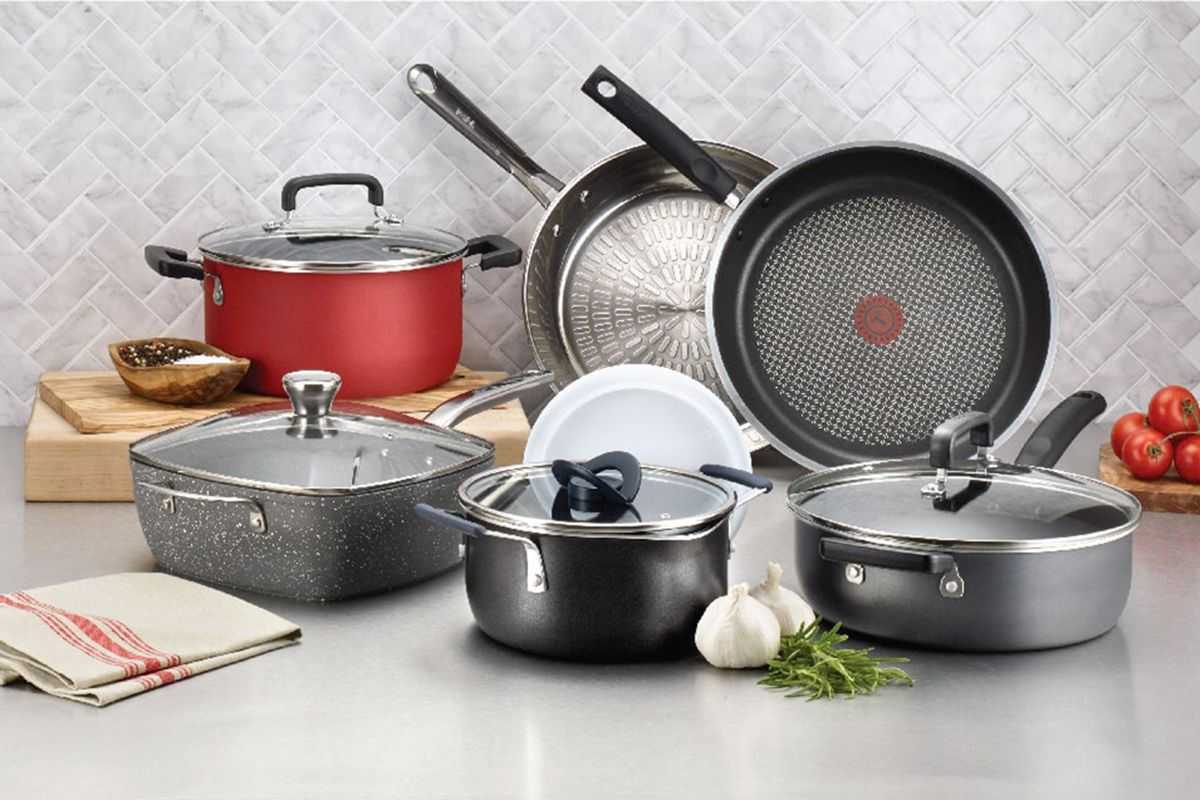
This budget option is quite commendable. Among the top choices, the T-fal set stands out as a popular one. Unlike anodized aluminum, the aluminum in this set does not undergo the hardening and strengthening process. However, with proper care, you can still enjoy several good years of use from it.
Hard anodized aluminum with ceramic nonstick coating
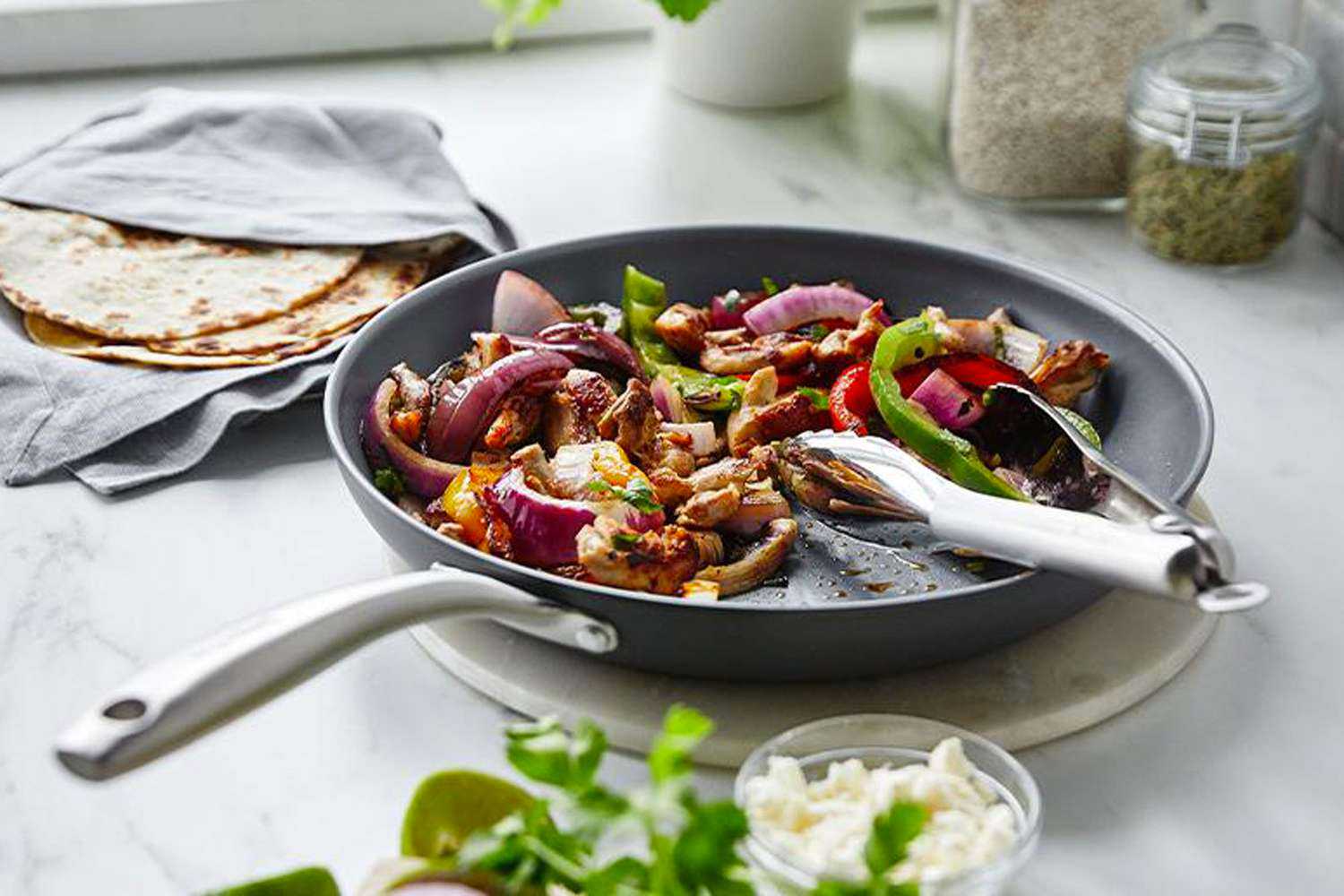
If you are in search of aluminum cookware with a non Teflon nonstick surface, GreenPan is the ultimate choice. It is the best option available in the market.
Hard anodized aluminum with Teflon/PTFE nonstick coating
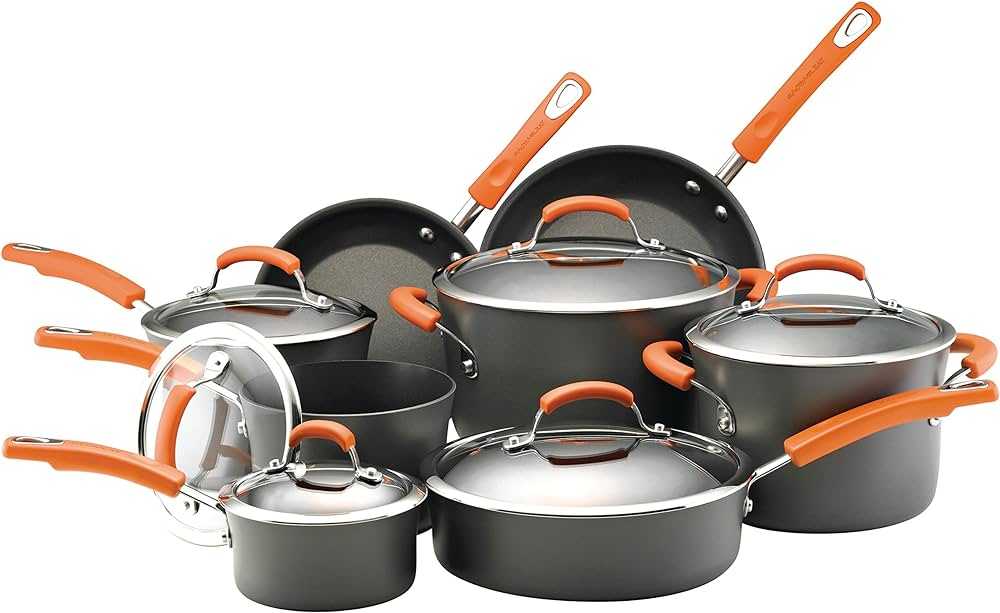
Having read the previous section, it is evident that a hard anodized aluminum nonstick pan has the potential to outlast a plain aluminum nonstick coated pan by three times. Therefore, if you are seeking a nonstick pan similar to Teflon, it would be wise to invest a little more and opt for a hard anodized pan.
In this category, my personal top choice is the Rachael Ray hard anodized aluminum cookware.
Which is better? Ceramic or Teflon/PTFE coated aluminum cookware?
Different answer: It varies based on your cooking techniques, cooking preferences, and the type of cookware you prefer. As the Cookware Advisor, we remain neutral and provide information to assist you in making an informed decision.
Each type of cookware has its advantages and disadvantages. Ceramic coated cookware is known for its high heat resistance and does not emit fumes when exposed to high temperatures. On the other hand, Teflon is considered to be a superior and long-lasting nonstick option. To get a comprehensive understanding, I recommend reading my article on Ceramic vs Teflon to determine which option suits you best.
And now the raging debate: Is aluminum cookware safe?
Please be aware that I am not attempting to alter anyone's viewpoint as this topic can be sensitive for many individuals. My objective is solely to present the information I have gathered and provide a clear explanation. If it resonates with you, that's wonderful. If not, that's perfectly fine as well. Consider purchasing a set made of stainless steel or copper.
This question can actually be divided into two parts: 1. Does aluminum transfer into food from cookware? 2. Is aluminum considered safe?
Let's address each of these inquiries separately.
Does aluminum leach into food from cookware?
The concise response: minimal impact!
It is crucial to note that the majority of aluminum cookware is either coated with a non-stick surface, hard anodized, or made with stainless steel cladding (such as Cuisinart MCP). In all of these cases, the food does not come into direct contact with plain aluminum, resulting in very low chances of leaching.
Now, let's discuss plain aluminum pans, which are not commonly used by most people anyway. According to the National Center for Biotechnology Information (NCBI), cooking in aluminum containers may slightly increase the aluminum content in food, but the impact is insignificant.
A study referenced by Healthfully (formerly Livestrong.com) and published in the "Journal of Food Protection" estimates that cooking in aluminum pans or using aluminum foil may add approximately 3.5 mg of aluminum to daily intake. Considering that the average daily intake of aluminum from natural sources is between 1-10 mg for most individuals, this additional amount does not pose a health risk.
Furthermore, an independent lab test conducted by Cook's Illustrated (America's Test Kitchen) in 2012 found that tomato sauce, an acidic food, cooked in an aluminum pan for 2 hours and then stored overnight contained only 0.0024 mg of aluminum per cup.
To put things into perspective, certain over-the-counter antacids contain more than 100 mg of aluminum in a single dose.
Update 2021 - A reader's question prompted me to investigate the leaching of aluminum in new versus old aluminum pans. It is important to note that we are specifically referring to uncoated pans, such as those found in pressure cookers. Research suggests that an older pan may leach more aluminum (more than double) into food compared to a newer one when used to cook the same type and quantity of food (in this case, rice). However, the amount of aluminum that leaches into the food remains within acceptable levels and does not pose a health hazard.
Conclusion:
Food cooked in coated or anodized aluminum cookware does not come into contact with aluminum. Therefore, there is no risk of aluminum leaching into the food. Even in the case of untreated aluminum cookware, the amount of aluminum that may leach is minimal and does not pose any health hazards.
Is aluminum safe?
To recap, we have established that the majority of aluminum cookware is either coated, anodized, or clad, ensuring that food does not come into direct contact with the metal.
For those who are in the minority and use plain aluminum cookware, the amount of metal leaching appears to be minimal. This also applies to non-stick aluminum pans with worn or scratched Teflon or ceramic coatings.
In my opinion, this makes it quite safe.
Despite this, the misconception that aluminum cookware causes Alzheimer's disease persists, even though 60% of us use some form of aluminum cookware.
Let's delve into the origins of this myth. Several decades ago, during the examination of a deceased Alzheimer's patient, researchers discovered an unusually high concentration of aluminum in his brain. Since then, aluminum has been associated with Alzheimer's, and aluminum pots and pans have been unjustly accused.
However, the link between Alzheimer's and aluminum has been repeatedly debunked. According to the Alzheimer's society, there is no compelling evidence that aluminum increases the risk of developing Alzheimer's disease. The FDA also reports that aluminum does not cause Alzheimer's disease and the use of aluminum products does not pose a health risk.
Furthermore, Dr. David Perlmutter, a renowned neurologist and bestselling author of Grain Brain, asserts that brain disorders, including Alzheimer's disease, are primarily caused by excessive consumption of carbohydrates and grains, not aluminum cookware.
In light of these facts, I firmly believe that aluminum cookware is safe.
If you still have concerns about using aluminum cookware, I would suggest opting for stainless steel as an alternative.
Cookware Advisor pick for top two favorite aluminum cookware options:
- Caraway Cookware
- Rachael Ray Hard Anodized NonStick Cookware